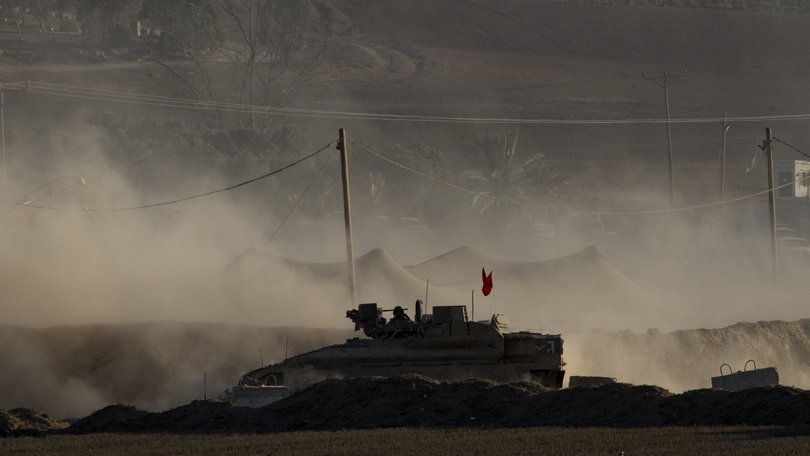Mideast War: Israeli Security Cabinet approves full military takeover of Gaza
Israeli leaders have approved the plan for the occupation of the besieged enclave, a move which promises to take the nearly two-year war into uncharted terrain.

Israeli leaders early Friday approved a plan for the gradual military takeover of all of the Gaza Strip, a pivotal and risky decision that went against the recommendations of the Israeli military and promised to take the nearly two-year war into uncharted terrain.
After 10 hours of deliberations, a majority of Prime Minister Benjamin Netanyahu’s security Cabinet backed his proposal to prepare to conquer the core of Gaza City, according to a pre-dawn statement from his office,
At a later stage, the military is expected to push into central areas of the enclave where Hamas is believed to be holding Israeli hostages and where the military has largely refrained from operating before.
Sign up to The Nightly's newsletters.
Get the first look at the digital newspaper, curated daily stories and breaking headlines delivered to your inbox.
By continuing you agree to our Terms and Privacy Policy.The goal, according to the statement, is to achieve a decisive victory over Hamas. The plan allows for the provision of humanitarian aid to the civilian population “outside the combat zones,” it said.
It is likely to take the military days, at least, to call up reserve forces, carry out troop deployments for a push into Gaza City and allow time for the forced evacuation of tens of thousands of Palestinians from the new areas of combat.
The Cabinet also approved five principles for ending the war, including the disarming of Hamas; the return of all 50 hostages, 20 of whom are believed to be alive; the demilitarisation of Gaza; Israeli security control over the enclave; and the establishment of an alternative civilian administration there that involves neither Hamas or the Palestinian Authority, the rival, Western-backed body that exercises limited control in parts of the occupied West Bank.
The Israeli military has said that it already conquered about 75 per cent of Gaza. The coastal strip stretching from Gaza City in the north to Khan Younis in the south is the main area outside Israeli control. Many of the 2 million Palestinians in Gaza, including those displaced from their homes in the territory, have squeezed into tents, makeshift shelters and apartments in those areas.
Mr Netanyahu said Thursday, local time, that Israel planned to take control of all of Gaza, bucking the advice of the Israeli military and warnings that expanding operations could endanger the hostages being held there and kill more Palestinian civilians.
He made the comments in an interview with Fox News before the security Cabinet meeting. They came as talks to achieve a ceasefire and the release of the hostages have hit an impasse, with Israeli and Hamas officials blaming each other for the deadlock.
When asked whether Israel would take over all of Gaza, he responded, “We intend to.”
Mr Netanyahu said the move would “assure our security,” remove Hamas from power and enable the transfer of the civilian administration of Gaza to another party.
“We want to liberate ourselves and the people of Gaza from the awful terror of Hamas,” he said in an excerpt from the interview, without providing details on any planned operation.
The Prime Minister, however, suggested Israel was not interested in maintaining permanent control over the entire enclave. “We don’t want to keep it,” he added. “We don’t want to govern it. We don’t want to be there as a governing body. We want to hand it over to Arab forces.”
In the excerpt published by Fox News, Mr Netanyahu offered few specifics about his plan. Some analysts have said that he has threatened to widen the offensive to compel Hamas to offer concessions in the ceasefire negotiations.
Hamas, in a statement Thursday, said Netanyahu’s comments “represent a clear reversal of the course of negotiations and clearly reveal the true motives behind his withdrawal from the final round.”
Israel’s expansion of military action would also be in defiance of many other countries urging an end to the nearly two-year war in Gaza. In recent weeks, Israel has come under growing pressure from some long-standing allies to do more to address a hunger crisis in the enclave.

The Israeli military’s chief of staff, Lieutenant-General Eyal Zamir, has pushed back against the plan, according to four Israeli security officials, who spoke on the condition of anonymity to discuss sensitive issues. He has shared concerns about the exhaustion and fitness of reservists and about the military becoming responsible for governing millions of Palestinians, they said.
The military leadership would prefer a new ceasefire instead of ramping up fighting, according to three of the officials. A majority of the ministers believed that the alternative proposals put forward by the military would not result in the defeat of Hamas or the release of the hostages, according to the statement from Netanyahu’s office.
In earlier stages of the war, Mr Netanyahu and the Israeli military clashed about strategy. But the latest episode appeared to be the most significant showdown since the government appointed Zamir in February.
At the time, members of the governing coalition hoped that he would be more closely aligned with their approach than his predecessor. In recent days, however, he has been criticized by some supporters of the government.
The Israeli military released comments made by Lt-Gen Zamir on Thursday in which he said “the culture of debate” was “a vital component of the IDF’s overall culture — both internally and externally,” referring to the Israel Defense Forces.
“We will continue to express our position without fear,” he added. “That is the expectation we have of our commanders as well. The responsibility lies here, at this very table.”
The military believes it could seize the remaining parts of Gaza within months, but setting up a system similar to the one it oversees in the Israeli-occupied West Bank would require up to five years of sustained combat, three of the security officials said.
On Tuesday, Mr Netanyahu’s office said in a statement that the Israeli military would carry out any decision made by the security Cabinet.
Members of Israel’s opposition and the families of the hostages held by Hamas and Palestinian Islamic Jihad in Gaza have cautioned against expanding the military operation.
“Conquering Gaza is a bad operational idea, a bad moral idea and a bad economic idea,” Yair Lapid, the leader of the parliamentary opposition, told reporters Wednesday after a meeting with Mr Netanyahu.
The families of hostages worry that extending Israeli control could lead the military to inadvertently kill their loved ones or Hamas to execute them.
About 250 people were taken hostage during the October 7, 2023, Hamas-led attack on Israel, and more than three dozen hostages have been killed while in captivity, according to an investigation by The New York Times. Israeli authorities have said that up to 20 hostages in Gaza are believed to be alive. The bodies of 30 others, they say, are also being held in the territory.
“Hamas is a brutal terrorist organization, and they’ll kill hostages if the military comes near them,” said Elhanan Danino, whose son, Ori, was killed by his captors a year ago when Israeli soldiers were operating near a tunnel in southern Gaza in which he was being held.
“Every moment they are being held there — being starved — puts their lives at risk,” Mr Danino added. “I don’t want to see other hostages die the same way our son did.”
For Palestinian civilians, the possibility that Israel could escalate its operation has heightened fears that many more residents could be killed and that their already miserable living conditions in Gaza could become worse.
“They’re talking about occupying areas that are packed with so many people,” said Mukhlis al-Masri, 34, who was forced to leave his home in northern Gaza and is now in Khan Younis. “If they do that, there will be incalculable killing. The situation will be more dangerous than anyone can imagine.”
On Sunday, Mr al-Masri said that his brother, brother-in-law and four nephews and nieces had been killed and that his sister had been seriously wounded when a school-turned-shelter was bombed in Khan Younis. He said that he was staying in a tent near Al-Nasr Hospital in the city to be near his sister, who is in the intensive care unit there.
The Israeli military asked for more information about the bombing but did not provide further comment. The military has said that its strikes target militants and their weapons infrastructure in Gaza and has stressed that Hamas has embedded itself in civilian spaces.
This article originally appeared in The New York Times.
© 2025 The New York Times Company
Originally published on The New York Times
